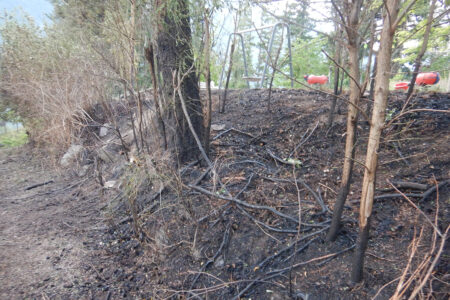Marijuana can be a patient's lifeline to health, says advocate
Medicinal marijuana access is becoming increasingly complex in Canada as licenced users are challenged yet again with changes to the rules for growing the drug.
Despite a growing acceptance of the medical uses of the plant across the country, changes planned by Health Canada to the current system will see doctors being able to process licences thereby easing access on one hand for patients, but will cancel licences for patients to grow their own, explained Jim Leslie, federally licensed medical marijuana patient and president of the Lifeline Medicinal Cannabis Dispensary.
Thirty-five participants attended a recent workshop at Christina Lake that gave a glimpse into the benefits and challenges associated with the plant. Leslie hosted the workshop exploring the science behind the multiple therapeutic uses of medical marijuana and its active constituents known as cannabinoids. Leslie’s goal was to inform a wider community on information about the potential of cannabis as a medicine, issues facing government’s decision makers in the coming months, and how to get a licence for patients.
With over 85 active cannabinoids in the plant’s bounty, the synergy of the medicine with the human body’s own endogenous cannabinoid system creates the benefits to patients, Leslie explained.
“On virtually every measure available, cannabis is safer than everything on this chart (opiates, nicotine, and alcohol). It’s comparable to caffeine and coffee,” Leslie explained. “There’s nothing sneaky about this that’s hiding in the dark waiting to hurt a person. There’s good and bad ways to use everything but predominantly this a very benign and safe substance.”
Health Canada estimates that about seven percent of the population is using medical marijuana, said Leslie. That means 2.3 million people across the country, 509 in Grand Forks, 100 in Christina Lake, 44 each in Greenwood and Midway – and Leslie suggests that is low. But only 3,000 patients in B.C. are licenced despite an estimated 308,000 users meaning the majority of these people are at risk of arrest and imprisonment.
The use of marijuana dates back thousands of years, said Leslie as he gave an overview of the background of the plant and its known uses, but, he noted, there has yet to be a death attributed to using the drug.
“The lethal dose of cannabis, they speculate it would take consuming hundreds of pounds of cannabis in 15 minutes, and that might get you close to a lethal dose but you’d probably pass out first or choke on all the pot you were swallowing,” joked Leslie.
Benefits to patients are just now becoming fully understood as scientific research verifies evidence for use in cancer treatments, anti-psychotic effects, potential impacts on Alzheimer’s disease, and, of course, the most widely known uses – pain and nausea relief. The key to using marijuana is to find the right dose, strength and strain of cannabis which is why Leslie believes that compassion clubs or dispensaries are important to support patients.
“Unless you can point to actual research that says time and time again exactly why and who and how this works you cannot make a claim for curative powers of cannabis, but what you can say is we’re starting to understand why it kills cancer cells specifically (for example),” said Leslie. “I think the research is fascinating… This is an aspect that needs more research and attention.”
But access in Canada remains largely in the hands of the illegal drug trade, Leslie explained, including compassion clubs or dispensaries which, to date, are still not recognized by the Government of Canada. The clubs operate in the “grey zone,” said Leslie, and many doctors remain reluctant to sign patient’s licence applications. In response to pressure for improving the current medicinal marijuana program, Health Canada is looking at removing individual grow ops and basing the production of the medicine with large centralized grow operations.
“The conditions are onerous for a plant and substance that is so therapeutic and of great benefit,” Leslie commented. “(Under the new system) patients will be subjected to the mercy of the market. These commercial operations will have no price caps, they’ll be able to grow whatever they want, but generally speaking it will be the strains that sell the best. Some of these things are difficult to grow. I think people could be priced out of their own medicine.”
Not only will the proposed federal approach of setting up large commercial grow operations impact patients for access and quality of the specific products they are looking for, recently passed bill C-10 could see patients jailed if they do attempt to grow their own medicine. It seems, commented Leslie, that the systematic changes patients and advocates have been requesting for years are not heading the right direction.
“When (bill C10) comes I fear for those people (using marijuana as a medicine without a licence). Luckily the program will be changing for access so that hopefully they can cover off these people before the jail cells open up,” Leslie added.
Not many questions were fielded by Leslie at the presentation, with many of the participants seeming to appreciate the information he provided.
“I think all us need to know this information and make our mind up accordingly,” said area C regional director Grace McGregor who funded the workshop.























